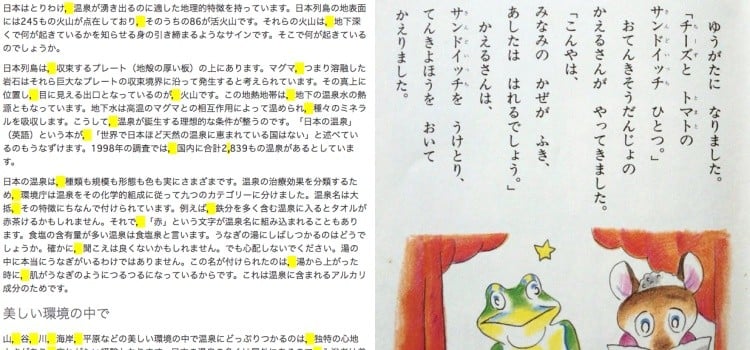If you're a Japanese student, you may have noticed that it doesn't use spaces between words in most sentences. Already in some texts you can see spaces between some words or phrases, leaving you a little confused. In this article, we will understand why Japanese people don't use space in their language and when they do.
Índice de Conteúdo
Why doesn't Japanese use spaces?
The fact that Japanese is a syllable-based language, and has 3 different writing systems, makes spaces unnecessary. In addition, particles, verb endings and expressions make it easy to understand sentences and separate words without the need for spaces. Japanese sentences always have a pattern, this helps with word separation.
Another factor that contributes to the lack of space in the Japanese language is that many kanji and words are quite short. If they used spaces to separate words, it would be very weird to read something like this: 私はケビンです。Since it is very easy to read and separate the words of these sentences 私はケビンです。 Also note that the Japanese keyboard space is larger than other languages .
The biggest difficulty of the lack of spaces in Japanese is the particle は (wa) which can rarely end up being the beginning of a word and leave you totally confused. The lack of spaces is one more reason to understand the importance of Kanji in the Japanese language. Anyway, spaces in Japanese are unnecessary because the word separation is already quite obvious. Of course, for those learning, it can be confusing.
When does Japanese use spaces?
The Japanese language only uses spaces when it is the end of a sentence separated by comma or period. Spaces are sometimes used to separate clauses, especially when punctuation is left out.
The space is also used in texts that are made for children or written only in hiragana, or katakana. Sometimes you can find rare spaces in mangas, novels and some textbooks. You can also find spaces in karaokes or movie subtitles, only in this case it's due to pauses. There may be a space between the first name and the family name.
Curiosities about space
- It is not necessary to give a space after a comma, parentheses, square brackets or punctuation. On the Japanese keyboard, these characters are already written with a space;
- The word "espaço" in Japanese comes from the English "スペース" (supēsu). Do not confuse it with the word for outer space which in Japanese is 宇宙 (uchuu).
- Some foreign students often put a space after the particle to help not confuse words with particles;
- Instead of space, in some cases, a black dot is used (・) in the center called nakaguro (中黒) to separate one complicated word from another. This period has various uses such as separating lists, titles, names, etc;
So, you don't have to worry about space in the Japanese language. With time and practice, you will be able to understand and separate the words with ease. What do you think about this subject? Does lack of space make Japanese harder for you? We await your opinion in the comments and your possible sharing.





